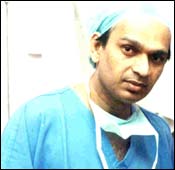Home > News > Specials
The Rediff Special/Shobha Warrier
January 14, 2004

On December 24, 2003, when 15-month-old Mohammed Talha from Rawalpindi, Pakistan, looked at his parents for the first time in his life in Chennai, India, he was seeing them through the eye of an Indian, a 61-year-old woman old enough to be his grandmother.
"When my son sees the world around him in Pakistan, it will be through the eye of an Indian. Similarly, all the barriers between India and Pakistan should go. There are no differences between us," said Talha's mother, 23-year-old Kanwal Shahzad.
Talha, Kanwal and Khuram Shahzad's first child, was born blind; four of Shahzad's cousins and the son of a cousin are also blind. With Pakistan's medical fraternity unable to help, the distraught parents lost hope.
Then, Kanwal's father, a businessman based in Dubai, got in touch with Dr Agarwal's Eye Hospital in the United Arab Emirates. They told him to get in touch with the main hospital in Chennai. When Khuram Shahzad, a businessman based in Rawalpindi, did that, the Chennai hospital asked him to come down immediately.
 Many of their relatives were not happy with the young couple's decision to bring their child to India. "We were not sure whether we would be welcome in India. We were scared," Kanwal admitted frankly.
Many of their relatives were not happy with the young couple's decision to bring their child to India. "We were not sure whether we would be welcome in India. We were scared," Kanwal admitted frankly.
The visas were issued within a week, but the family was forced to delay their trip as the Lahore-Delhi bus was fully booked for a month. Finally, on December 14, Talha and his parents reached Delhi by bus and then flew to Chennai.
Dr Amar Agarwal, director of the eye clinic, examined Talha and found him blind in both eyes. The scan showed the cornea was white and the iris was stuck to the cornea. The only hope, Dr Agarwal concluded, was either an eye transplant or a corneal transplant.
As luck would have it, at two in the morning on December 23, the hospital received a phone call from one Venkatesh, informing them that his 61-year-old wife Maragatham had died and it was her wish to donate her eyes. An ambulance rushed to his house to collect the eyes before the last rites were performed.
Talha was operated upon the following day. The operation started at 8 am and lasted four hours. "We had to dissect the cornea from the iris and implant the fresh cornea. It is a very complicated process," Dr Agarwal explained.
The next day, the doctors removed the bandages that had covered Talha's eyes since the operation. The child began crying, but when he saw his mother for the first time in his life, he stopped crying. "I cannot say what I felt then. It was an overwhelming experience. Our joy knew no bounds. Our son saw us for the first time. We had left everything to the doctors and to God," said Kanwal, searching for words.
 Now, Talha knows whom to smile at and whom to make faces at. If a lady in a white coat comes to his room, he knows she is there to give him an injection. He does not like the needle one bit so he refuses to smile at her. But if someone dressed in coloured clothes enters his room, he is confident the visitor is there to take him out for a stroll. He also enjoys imitating others.
Now, Talha knows whom to smile at and whom to make faces at. If a lady in a white coat comes to his room, he knows she is there to give him an injection. He does not like the needle one bit so he refuses to smile at her. But if someone dressed in coloured clothes enters his room, he is confident the visitor is there to take him out for a stroll. He also enjoys imitating others.
Talha will be on anti-rejection drugs for at least a couple of months and the Shahzads have been asked to return for a check up after six months and, if possible, an operation on the left eye. His right eye now has a vision of around three metres (10 feet) and the glasses he has to wear have a power of +10. "As he grows old, his visibility will definitely improve," said a satisfied Dr Agarwal.
He added that India is very advanced in the field of ophthalmology. "Till now, patients from Pakistan found it difficult to come here; the only route was via Dubai. With the resumption of road and air links, it will be a lot easier for Pakistanis to come to India for treatment. I would say Talha is going to be the goodwill ambassador for India and Pakistan as an Indian eye is going to blink in Pakistan."
The family is fulsome in its praise for India. "We never knew Indians were so nice and loving. Only politicians fight, ordinary people don't. The family that donated the eye visited Talha and bought him lots of toys. They were so good. We are going back with such wonderful memories," said a visibly happy Kanwal.
Back in Pakistan, the family's relatives, who were initially apprehensive about the travel to India, are so excited that one of Shahzad's cousins now intends to take his six-year-old, who suffers from the same congenital defect, to Chennai for treatment.
Photographs: Sreeram Selvaraj
Image: Uttam Ghosh